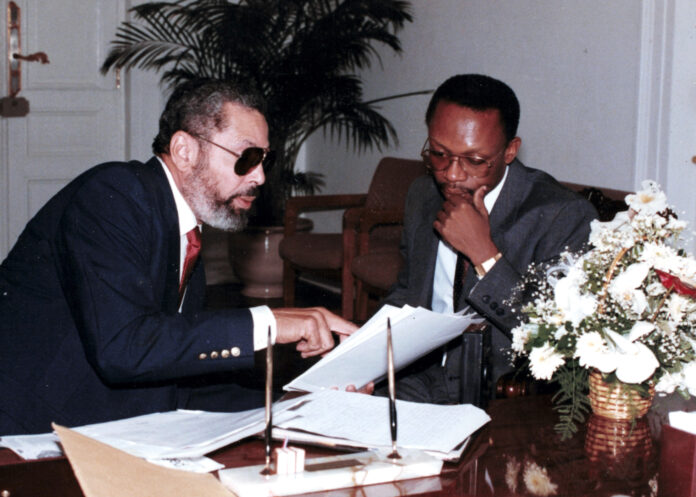Haiti’s Sep. 30, 1991 coup d’état was a challenge which tested and strengthened the organizations in Ben Dupuy’s revolutionary network.
Ambassador-at-Large Dupuy was returning from an outreach trip to Scandinavia when the coup struck. After a brief stopover in New York, he quickly flew to Caracas, Venezuela (then ruled by President Carlos Andrès Perez), where he met with the now exiled President Jean-Bertrand Aristide.
The bloody, brazen coup by the Armed Forces of Haiti (FAdH) against Haiti’s nascent democracy and overwhelmingly popular young president had shocked the world. This is the moment, Dupuy told Aristide, to train and arm a liberation force to restore his government to power. Dupuy said that he could raise hundreds, if not thousands, of willing young Haitians, starting with his own National Popular Assembly (APN), who could be trained in Venezuela or another country. Aristide listened but was hesitant.
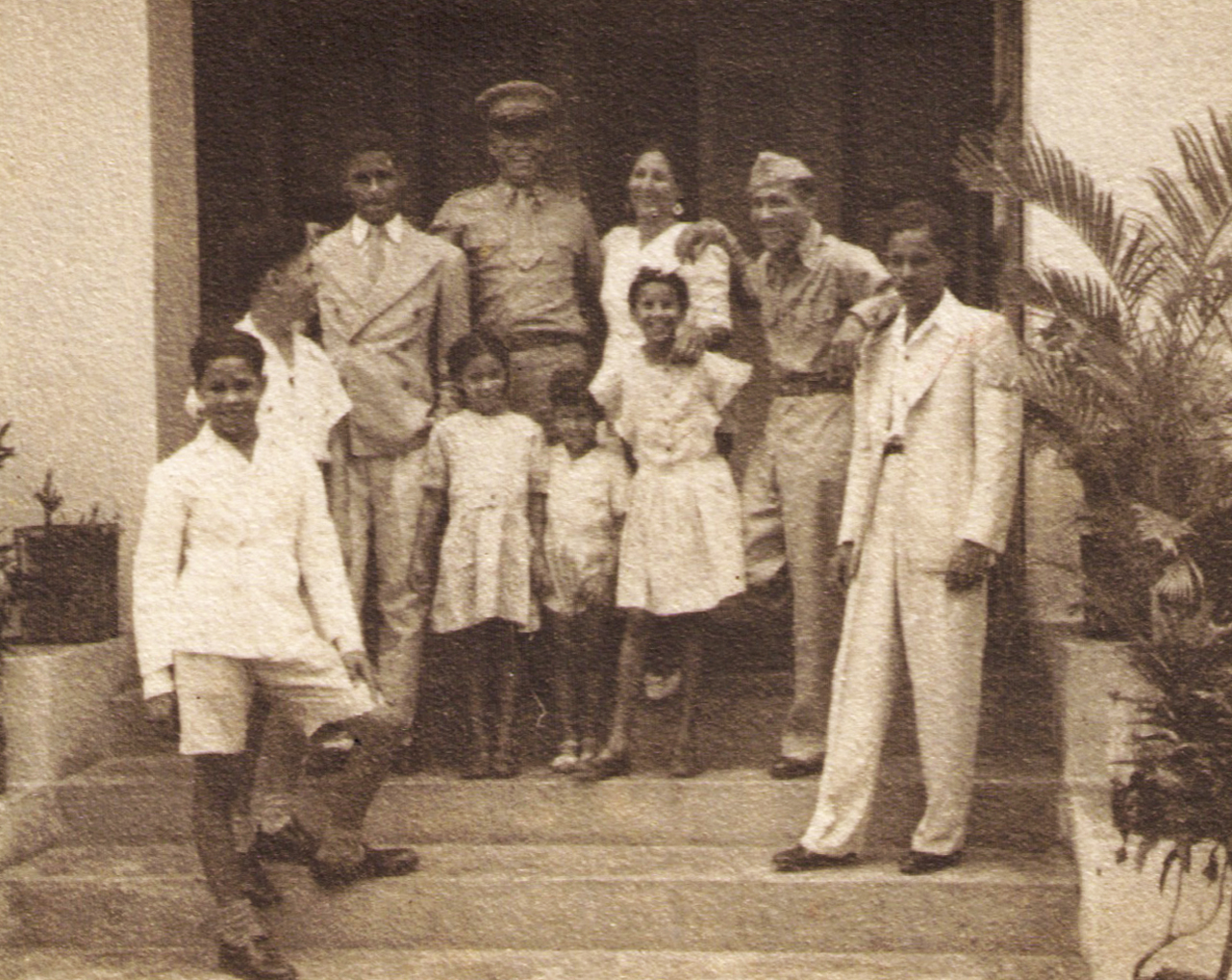
This would be the beginning of a two year struggle between Dupuy and an opposing sector of Aristide’s Foreign Service and inner circle, which viewed the path to restoration, not as an armed insurrection from Haiti’s mountains and slums against the coup-making military, but “finding the correct levers of power” in Washington, as Haitian Ambassador to the U.S. Jean Casimir told a large gathering of anti-coup activists in Washington, DC in October 1991.
Dupuy was categorically opposed to the specter of U.S. foreign military intervention into Haiti, which from the coup’s first days, before any other Haitian diplomat, he recognized as the likely end-game of negotiations with Washington and its vassal institutions acting as intermediaries, the Organization of American States (OAS) and the United Nations (UN). The Soviet Union had just crumbled, and Dupuy saw Washington’s unipolar “New World Order” as a beast with no constraints nor scruples.
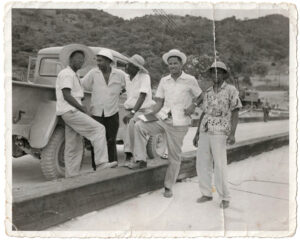
His virtually one-man crusade to foil their interventionist push was epitomized by one early 1993 meeting in which UN Secretary General Boutros Boutros-Ghali received Aristide at UN Headquarters in New York. According to his account, Dupuy practically forced himself into the meeting where he sat uninvited at the table amidst the other visibly uncomfortable diplomats and the ousted head of state.
“What would you like us to do?” Boutros-Ghali placidly asked Aristide, according to Dupuy, who sat glaring across the table. Perhaps flustered by Dupuy’s presence, Aristide beat around the bush, by Dupuy’s account, and did not ask that day for the UN to place Haiti under its Chapter 7 powers, where the Security Council takes control of a country.
However, Aristide did request Security Council intervention in a May 7, 1993 letter to Boutros Ghali and on Jun. 16, 1993, the Security Council put Haiti under Chapter 7 with its Resolution 841, thereby signaling an invasion’s inevitability.
Like Dupuy, Cuba, in a Jun. 14, 1993 letter to the Council, had argued strongly against the move, “opposing with the greatest energy the Security Council’s adoption of measures concerning the internal situation of this country” because it would create “a dangerous precedent which is in line with several previous attempts to give this body powers and a mandate which are larger than those granted in the Charter.”
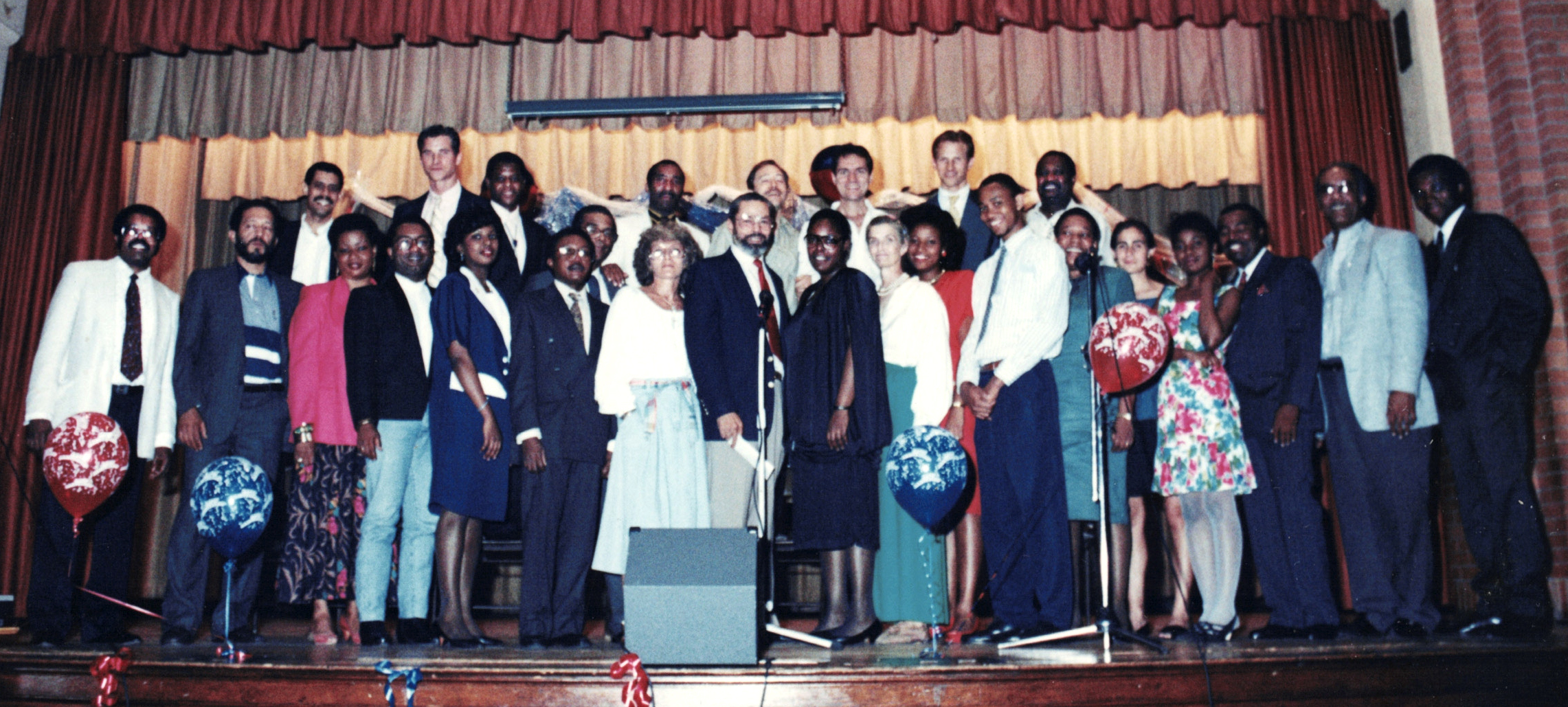
“By requesting the Security Council to take up the case of Haiti, Aristide has surrendered his leadership and control over efforts for his own restoration to an international body controlled by the very nation which had a hand in the coup which overthrew him,” wrote in a Jun. 26 statement the New York-based Haiti Commission of Inquiry into the September 30th Coup d’Etat, which was headed by Ben’s close friend and ally Ramsey Clark, the former U.S. Attorney General. “Having usurped control of the crisis in Haiti, the UN and the U.S. have begun forcing Aristide into a corner.”
In response, on Jun. 23, 1993, Dupuy resigned as Haiti’s Ambassador at Large with an open letter to Aristide that stated “without pretending to be more patriotic than anyone else, I think that it is extremely dangerous to put the country’s national sovereignty in the hands of an international organization whose real defense of the peoples’ rights, and even its impartiality, can legitimately be put in doubt at this time.”
Meanwhile, Dupuy was working feverishly on many other fronts. In December 1991, the Haiti Commission, which had Haïti Progrès cadre in its leadership, sent the first major human rights delegation to Haiti after the coup. That Ramsey Clark-led investigation was chronicled in the 1992 Crowing Rooster Arts documentary Killing the Dream, which aired nationally to great fanfare on the PBS network on the first anniversary of the coup.
Inside Haiti, the international embargo blocked the importation of Haïti Progrès. So the newspaper sent a portable printer into the country which clandestinely produced a local version of the paper. In those pre-Internet days, the articles had to be either dictated over the phone, sent by modem-to-modem communications, or transmitted by ham radio links, which Ben had mastered in his underground operations during the Duvalier regimes.
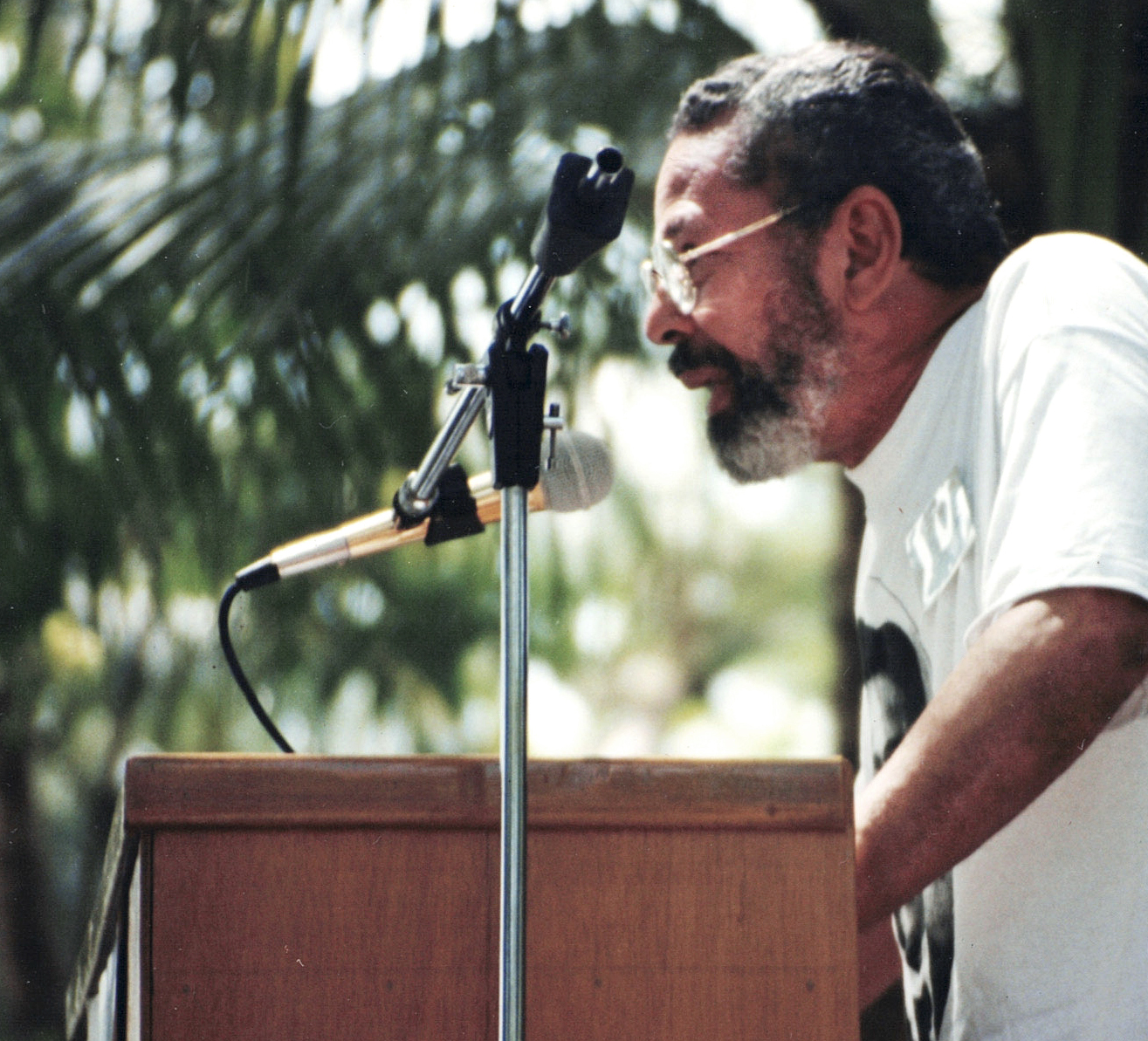
APN cadre conducted many acts of clandestine sabotage, like chain-sawing down trees on the routes between Port-au-Prince and Pétionville to impede the transport of soldiers. Dupuy also proposed to Aristide an aerial leaflet-drop, which was later carried out by formerly-Poughkeepsie-based Haitian pilot Frantz Gabriel and democracy activist Patrick Élie.
Dupuy’s network undertook numerous other clandestine operations against the coup, but on Sep. 19, 1994, U.S. troops finally landed in Haiti, beginning a six year military occupation that was handed off to the UN in 1995.
Despite the people’s demands, Washington did not allow Aristide to recuperate the three-years he spent in exile, and in 1996, his erstwhile ally René Préval became head of state. Dupuy’s Haïti Progrès, APN, and its new U.S.-based support group the Haiti Support Network (HSN) worked doggedly to resist and denounce the privatization campaign of Haiti’s state-industries that Préval carried out.
In 1999, as the year 2000 elections approached, APN transformed itself into the National Popular Party (PPN). It was not a traditional bourgeois electoral party but followed the Leninist model of a disciplined cadre “fighting organization.”
Meanwhile, Aristide’s new party, the Lavalas Family, formed in 1996, swept 2000’s legislative and presidential elections, hoisting Aristide again to power on Feb. 7, 2001. The U.S., now led by George W. Bush, immediately began a diplomatic, economic, and political campaign to overthrow Aristide, and Dupuy with the PPN came to his defense.
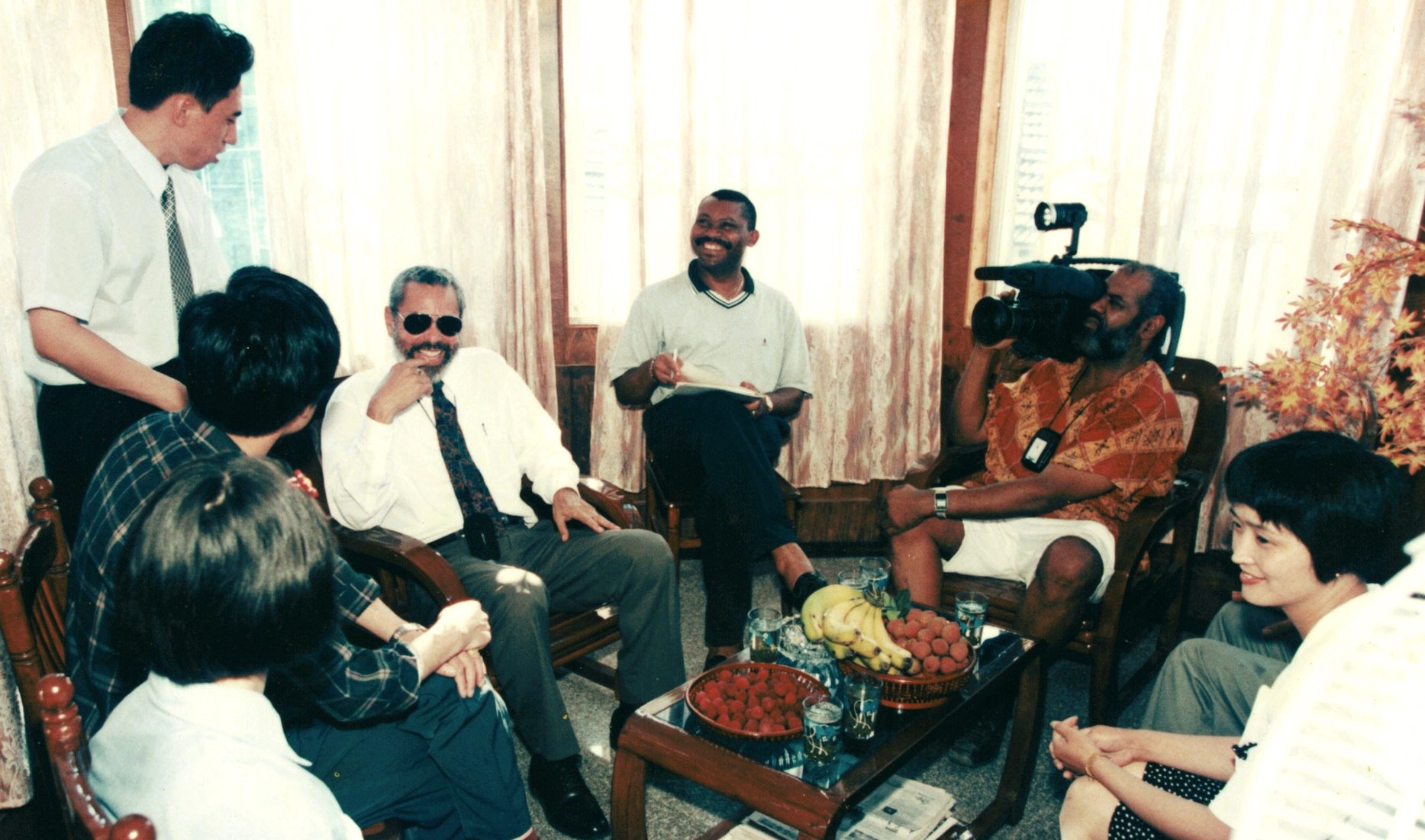
One of Dupuy’s strong recommendations to Aristide was to drop relations with Taiwan and recognize the People’s Republic of China. Toward this end, Dupuy led two delegations to China to send out feelers and promote the project of establishing relations, but it was not to be.
Aristide was again overthrown in a second coup d’état on Feb. 29, 2004. Having foreseen this eventuality, Dupuy had trained select PPN cadre for underground operations, which they successfully carried out during the second coup d’état.
Meanwhile, in the U.S. and Canada, Dupuy spearheaded a coalition which conducted in 2005 and 2006 the International Tribunal on Haiti, which held hearings in Washington, DC, Boston, Miami, and Montreal.
In 2006, several members of Haïti Progrès left the paper to form Haïti Liberté. Following the 2010 earthquake and the U.S. facilitating Michel Martelly’s election, a split arose in the PPN and Haïti Progrès, resulting in Ben’s 2011 ouster, what he referred to as “the coup.”
By 2012, he was back in touch with his old comrades at Haïti Liberté and regularly advised the paper on its editorial line and analysis. He made several trips to New York to participate in Haïti Liberté events.
In the last decade of his life, Ben Dupuy became a familiar fixture at Miami Beach’s Tap Tap Restaurant, along with his old friend, singer and composer Manno Charlemagne, who died in 2017.
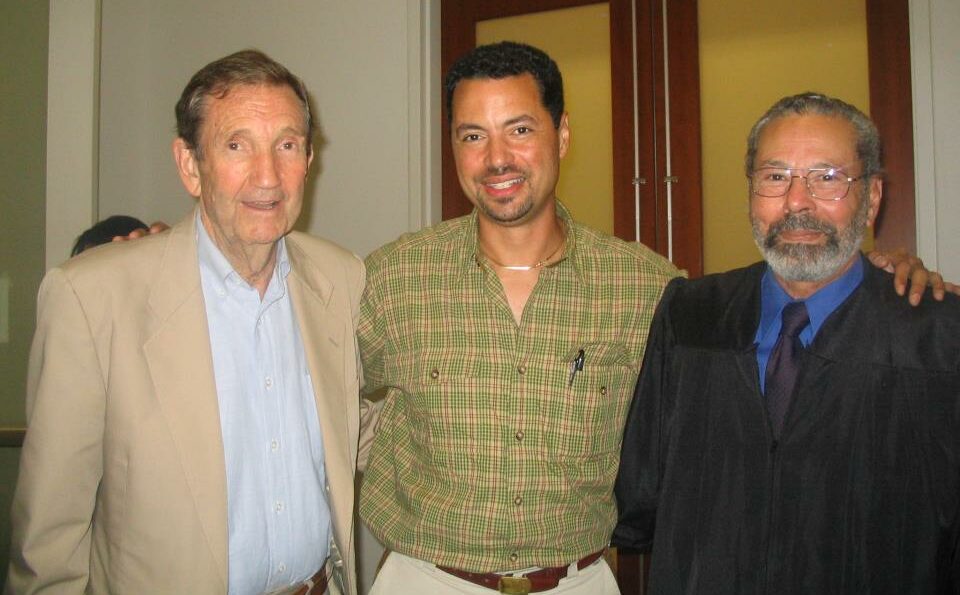
Dupuy was already suffering from emphysema, and in late 2022, a doctor suspected he may have developed lung cancer after a life-time of smoking unfiltered Pall Mall cigarettes. However, the doctor advised against treatment, citing Ben’s age and frailty of health.
Up until entering a Miami Beach nursing home in August 2022, Ben maintained regular contact with his former comrades in New York and Haiti.
Despite his body’s deterioration and some mild confusion and repetition, Ben’s mind remained sharp until his final days. As friends and family visited his bedside, he would converse with them about world events and developments in Haiti.
Until the end, he maintained his methodical intellectual approach, drawing on lessons he had learned and books he had read over his nine decades of life as he held forth, between bouts of coughing.
A long-time APN and PPN leader, Harry Numa, who tragically died in 2014, summed up Ben Dupuy’s historical legacy. “Our nation had three great ideologues in the late 20th and early 21st century,” Numa said. “Serge Beaulieu [who had Radio Liberté] was the ideologue of the Macoute sector, articulating the outlook of the grandon [big landowner] class. Jean Dominique [who had Radio Haïti Inter] was the spokesman for Haiti’s bourgeoisie. But Ben Dupuy has given voice to Haiti’s working masses, analyzed and interacted with the world from their point of view, in their interests, and engaged with them.”
The champion of Haiti’s exploited and oppressed working masses: Ben would have been very satisfied with that epitaph.
The last of his seven siblings to die, he is survived by his four children – Frantz, Mike, Regine (Gigi), and Sarah – along with seven grandchildren and five great-grandchildren.
A memorial to his life will be held at Guarino Funeral Home in Brooklyn’s Canarsie, NY on Jun. 3 from 11 a.m. to 2 p.m.
Other memorials are planned for Miami on May 28, at Haïti Liberté in June, and a final one later in Haiti.

